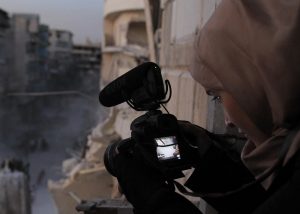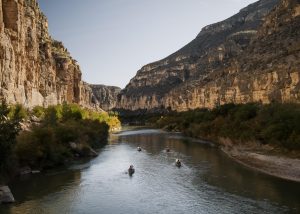SXSW, the annual mega-event in Austin, TX, has become not just a festival, not just a destination, but a spectacle in four dimensions. As cosplay characters, bizarrely groomed dogs, illuminated scooters and rickshaws wove through my 2019 journey, I could visit a battery of corporate “houses” programmed to attract attention, attend “parties” promoting the latest app or device, or visit massive installations celebrating digital artistry that brings echoes of 1970s lightshows.
It takes focus to pay attention at SXSW, where your time is the most relevant currency. I found treasures in the category of social-documentary film.
Wider Truths through an Intimate Lens
When I asked SXSW film festival head Janet Pierson about the curatorial objectives for documentary, she explained, “We’re interested in films with a strong authorial point of view that, ideally, display cinematic talent, and from filmmakers earlier in their feature filmmaking careers…Overall, I believe we’re known for films with really strong characters that demonstrate wider truths through an intimate lens.”

In For Sama, director Waad Al-Kateab films aerial bombardment from her window in Aleppo.
If there is one film in the festival that does that best, for my money it was the Grand Jury Prize and Audience Award winner, For Sama. This profoundly affecting, deeply unnerving, urgently relevant film tells one young woman’s story of living through the briefly optimistic Syrian Spring, the brutal siege of Aleppo and the retreat from that tragic city. Waad Al-Kateab, who co-directed with Edward Watts from the UK’s Channel 4, was an idealistic 19-year-old college student when she joined the student demonstrations, then she fell in love with a medical student, became committed to the dream of freedom, dignity and justice, and joined her husband in anchoring what eventually became Aleppo’s only hospital. Their baby girl, Sama, is the title character. Over the years, Al-Kateab became familiar to UK viewers as a Channel 4 reporter from Aleppo.
Telling the inside story of a war zone faces extraordinary challenges, and often those stories focus on the fighting. For Sama, by contrast, is a civilian’s and a woman’s story, of someone building a loving life with family and friends, sharing the common goals of dignity and autonomy. We come to care about the community, not just the couple.
Too often we get images in the news that reduce people to victims. This is a story of vulnerability, but not of victimhood. For Sama brims with agency, character and creativity. Because the human reality is so richly explored, this film also allows us to understand what is at stake in Syria in ways hard to grasp from news bursts. This included, for me, the central importance of Russian forces in the fighting, and the unrelenting assault on ordinary human rights by the Syrian government.
Such stories are sometimes rushed to screen. Al-Kateab and Watts, by contrast, spent two years, with support from the PBS series FRONTLINE and Channel 4. To salvage the material that Al-Kateab had smuggled out of the country, the filmmakers worked with digital experts to recover damaged segments. The team found a story, not just a chronology; they use flashbacks and a strong narrative by Al-Kateab to foreshadow, guide and shape the narrative. Only weeks before the premiere, they scrapped the original narration. Waad rewrote it, with poetic insight that Watts was able to shape to the pace of the film. “By the end, we could read each others’ thoughts,” said Watts.
After festivals and theatrical distribution, For Sama will air on FRONTLINE. Among other things, the film is an example of what public television investment can mean both in terms of art and public knowledge.
Politics as Performance
This year, SXSW became a showcase for bright new faces in politics, with visits (in conjunction with the Texas Tribune) from Elizabeth Warren, Stacey Abrams, Julian Castro, Pete Buttigieg, Beto O’Rourke and Alexandria Ocasio-Cortez. (AOC was the clear favorite, filling two overflow rooms as well as a convention ballroom and still disappointing fans who lined up throughout the gargantuan convention center.) Films such as Rachel Lears’ Knock Down the House and David Modigliani’s Running with Beto , the Documentary Spotlight Audience Award winner, fed the appetite of those addicted to the horse race, while also providing insights into character and motivation.

In Raise Hell, the complex life of fearless journalist Molly Ivins is recalled.
One of the my faves was a biopic of a classic political performer, the Texas journalist Molly Ivins. Janice Engel’s Raise Hell: The Life & Times of Molly Ivins won the Festival Favorite Audience Award, understandably. Her frank and intimate portrait of the hilariously acerbic political journalist was created over six years, and I think Molly Ivins would be honored, even if she flinched at times. Her alcoholism and the pain of family rejection features prominently in explaining how she could be maddeningly exasperating as well as brilliant, incisive, hilarious and a loving friend.
Other films featured hot issues in different ways. Several films focused on immigration. A standout for me was Ben Masters’ The River and the Wall, which won the SXSW Louis Black “Lone Star” Award. Ostensibly a millennial outdoor-adventure film, it evolves into a passionate polemic against Trump’s border wall. Five friends travel the Texas border on bikes, horses and kayaks, from El Paso to the Gulf of Mexico. Spectacular cinematography (the director and one of the cinematographers spent time at National Geographic) captures awe-inspiring landscapes and sunrises, and drone footage shows regions that need no wall to stop anyone. The team struggles to wade through swamps, clamber over cliffs and find a way around the impassible. They meet a farmer who’ll be separated from the farm’s water source, and National Parks employees who try to remain calm and professional while contemplating destruction of national heritage. A Border Patrol agent bemoans

In The River and the Wall, we get a closeup look at the border with Mexico.
resources allocated for a wall, rather than toward enforcement personnel. Two members of the team, who are undocumented immigrants and grew up in Texas, tell their stories. The film is both politically relevant and an engrossing adventure story. It makes its theatrical premier May 3 through Gravitas Ventures.
Also notable on difficult political issues was the quiet but powerful film Ernie & Joe, by Jenifer McShane. It follows two San Antonio police officers who are pioneering a new approach to mental health: acknowledging mental health problems and steering troubled people to help, then following up with them. We watch them talk a woman off a bridge, and then follow her through therapy and into a new life. (They disagree about whether she’ll make it.) We see them answer alarming 911 calls, and face daily challenges: a belligerent vet, a man who’s threatening violence. The job takes its toll on both of them; watching them find ways to decompress is itself pretty interesting. But they’re proud of a program that’s working. It’s just sad to see that this approach is pioneering instead of routine. But if it is going to become routine, Ernie & Joe is a solid and important contribution to explaining why it should.
Finally, the Salvadoran feature doc Cachada: The Opportunity, by Marlén Viñayo, was an unexpected delight. Dramaturg Egly Larreynaga works with five working-class Salvadoran women to recall their own traumatic memories and shame at their own behavior, including beating their children. They construct scenes and narratives that not only expose systemic domestic violence and other cruelties of poverty, but also allow them to find a space of dignity, self-respect and recovery. The film has already had a profound impact on the women themselves, who find themselves recentered and with more positive and productive family relationships. Its revelations, in which discovery, joy and horror are intertwined, cross cultures easily and could make this a valuable film—as well as model—internationally.
Quirky
Then there’s the kind of SXSW film that manages to combine the weird and the wonderful, and even do it in a way that doesn’t feel exploitative. That kind of film can open subcultural windows. Two films in competition, Erin Derham’s Stuffed and Rachel Stern’s Well Groomed, do that well. And they’re both films about competitive events, as well—a format that never fails to entertain, especially when you have strong characters, as these films do.

Taxidermy is both art and science in Stuffed.
Stuffed looks at contemporary taxidermy. Taxidermists who work for natural history museums value their role in conservation ecology, while also recognizing that most people will never understand how much art goes into the work. A new generation, though, is growing up practicing “rogue taxidermy,” in which they construct fabulous animals and fantastic environments for them—and showcase this work in galleries and art museums. Stuffed joins my shelf of films that explore weird ways that people living in late capitalism interact with the natural world.
Well Groomed profiles the world of extreme dog grooming. These are dogs that are dyed bubble-gum colors, whose coats are cut into landscapes and cartoon characters. (You could not miss them at SXSW.) The women who are headed for the grooming competition are mostly working dog-groomers themselves. They see themselves as extending their craft, and sometimes keeping themselves from the boredom of cutting their clients’ pets’ toenails and trimming their fur.
 Working women and small-scale entrepreneurs, they practice the peppy aspirationalism of self-help books. And they feel hurt when people see them as abusing the dogs, as the dogs clearly love them. I wanted more and better for these women than what they have in a normal work day, or even at their competitive events. They deserve more than the hope of an occasional trophy for all that goodwill and energy, and for their quite reasonable desire to be somebody and have a meaningful life.
Working women and small-scale entrepreneurs, they practice the peppy aspirationalism of self-help books. And they feel hurt when people see them as abusing the dogs, as the dogs clearly love them. I wanted more and better for these women than what they have in a normal work day, or even at their competitive events. They deserve more than the hope of an occasional trophy for all that goodwill and energy, and for their quite reasonable desire to be somebody and have a meaningful life.
